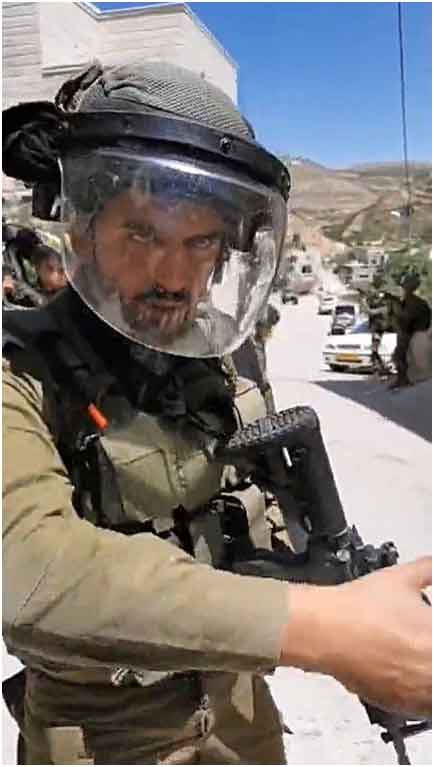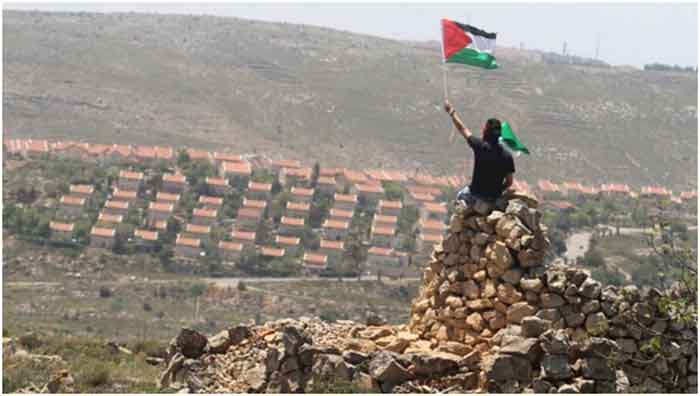
Israeli soldier executing the kidnapping of several Nahalin villagers southeast of Bethlehem in the West Bank, including Mohammad Afif Fannoun, on June 12, 2020
When you visualize it, as I try to, what does Israel’s forthcoming annexation of parts of the West Bank look like to you? I mean, what images do you expect to see when Israel makes its declaration, as is expected, in July? Do you perhaps imagine scenes of violence, terror and incitement to play out on social media and on the few seconds of mainstream TV that will be devoted to the announcement?
If you are expecting “an event” as Israel announces its third grand robbery of Palestinian land, you should know that Israel’s annexation is an ongoing process that has been in the making for several decades now.
The statements of condemnation by various international bodies already emerging (more to be expected, of course) sound “mundane” and “normal”, echoing as they do, words addressed to Israel many times since Israel forcibly altered the facts of dominion, demography and land ownership in Jerusalem, beginning June1967, and the West Bank.
Words, never meaningful action.
These statements continue to be utterly devoid of the consternation and helpless fury engendered in Palestinians by Israel’s continuing obliteration of the Palestinian Muslim and Christian character of the land of Palestine. By Judaizing Jerusalem, and now large swatches of the West Bank, Israel has succeeded in its project of drawing a curtain over Palestine’s history since 70 A.D., and claiming that our history only began with the advent of Theodor Herzl and the Zionist movement. Herzl is known to have said, “If whole branches of Jews must be destroyed, it is worth it, as long as a Jewish state in Palestine is created.”
The obliteration of Palestinian history has driven hundreds of Palestinians to record their personal histories by sharing images like this family picture of my own great grandfather Ismail, which I re-posted recently on Facebook with the following caption:

My great grandfather Ismail ibn (son of) Mahmoud ibn Khalil Al Najjar of #Lifta, in Lifta, Jerusalem, Palestine, circa 1945
“This country will either be Eretz [the land of] Israel with an absolute Jewish majority and a small Arab minority, or Eretz Ishmael [Ismail], and Jewish emigration will begin again if we do not expel the Arabs one way or another.”
– Spoken at a closed discussion in the summer of 1967, a conversation published in 1968 in the Israeli journal De’ot (‘Opinions’), by Israel Eldad (Sheib)
Ismail ibn (son of) Mahmoud ibn Khalil Al Najjar of Lifta, in Lifta, Jerusalem, Palestine, circa 1945
For a long time now, we have been witnessing on social media the incremental (“crawling”) process of Israel’s annexation unfold in the form of video clips and images. Some show outrageous scenes of Jewish “settlers” burning down ancient olive trees or, for that matter, a Palestinian family! Mainstream media carefully labels them “far right” — a few bad apples, and the band plays on.
Some clips manage to show the construction of Jewish colonies going up (with Palestinian labor!), but mostly we only see what Palestinians see and experience behind their walled off property that has already been confiscated by Israel. They are mostly scenes of Israeli harassment and containment, because the process of annexation does not end with the actual confiscation of Palestinian land and property (and, if need be, eviction and displacement); the next step is securing the robbery through a vicious well-orchestrated
campaign of terror and detention.
Take, for example, the following embedded video clip posted live on Facebook by Yousef Shakarnah on 12 June 2020 and titled in Arabic, “Storming the village of Nahalin, stirring up terror — a campaign of arrests, including the arrest of Mohammad Afif Fannoun, gas fire and sound bombs, as part of the project of control and annexation.”
‘Storming the village of Nahalin, stirring up terror — a campaign of arrests, including the arrest of Muhammad Afif Fannoun, gas fire and sound bombs, as part of the project of control and annexation’
Nahalin (also spelled Nahaleen), southwest of Bethlehem in the West Bank, is ringed by the vast Jewish “settlement bloc” of Gush Etzion. The lands of the village have already been subjected to a narrative that obliterates their Palestinian Muslim character, making way for the heist facilitated by the state for its “settler” Jews: The Jerusalem Post in 2015, for example, published a fake-news or hasbara piece claiming that 4,000 years ago “Tens of thousands of Jews, if not more, had lived in the area before even one Palestinian ever set foot in Gush Etzion … Thus, any claim that the current Jewish residents of Gush Etzion have seized lands here is false, even defamatory.”
When you view the video clip, what do you see? An annexation or a routine “security” operation? I asked two Jewish Israeli friends to take a look at the video to help me understand the Hebrew. The language and cultural divide that exists in such videos present an obstacle, not just for American viewers, but also for Palestinian and Jewish Israeli viewers, neither one of whom understands, literally, what the other is saying.
The video clip did not convey “annexation” to them. One of them wrote, in good faith, to say:
Not sure what you’re trying to write… but, unless I’m missing something, I don’t think this recording of what looks like a routine and uneventful visit is terribly meaningful. There may be thousands of such visits every year, and that is very significant, but I don’t see this one visit as remarkable. Again, unless there’s something I’m missing, or perhaps important context that I’m unaware of. Finally, I’m not sure I’d title it Annexation in Progress… Given current discussions about the expected annexation — of something, whether it is much of the Jordan Valley or less than that — this title could be misleading. When I see something like this, I think Occupation As Usual is a good title — which I’ve used over the years.
Technically, my friend is correct. He is in line with all the “technical” claims Israel makes to spit in the face of Palestinian reality— as in, for example, “there is no occupation.”
However, the process of ongoing Israeli robbery of Palestinian land, for that’s what “annexation” means, is inextricable from Israel’s acts of containment of Palestinian individuals, like the “routine” and “uneventful” act shown in the video clip above. There are thousands other similar incidents of Israeli soldiers coming to kidnap a young Palestinian man (or round up a group of them, as in this case), to subsequently torture and interrogate him and then subject him to a kangaroo Israeli military court that puts him away in prison for months or years.
Every single such act is a rape, an outrage, an annexation. We are not numbers.
Annexation is the deliberate taunting and bullying you see in the video clip, implying, as another friend put it, Israel “will do what it wants, when it wants, and there’s nothing we can do about it.”
For all the analogies made between Jerusalem and Minneapolis, for Palestinians, the path of demonstrations, legislation and finally reconciliation is simply not an option.

A man waves a Palestinian flag waves near the West Bank settlement of Ofra, near Ramallah (photo credit: Issam Rimawi/Flash90)
I’ll leave you now with an expressive description of some of what is on view in the video clip of the Israeli soldiers coming for Mohammad Afif Hannoun of Nahalin, written by the writer and activist Diane Langford, who took a look at it, at my request:
I see performative enjoyment of the ‘task’ as when the tooled up soldier blows a kiss. Can’t see anyone threatening them yet they are dressed in full battle kit that kind of reminds me of astronauts on the moon walk, something other worldly and dehumanising of the wearer, creating an atmosphere that something awful is going to happen, something violent. Their monstrous garb and over-protection of themselves by means of massive guns and full body armour reminds me that health workers around the world are facing Covid 19 without proper personal protective clothing. Is there a human being inside that shell? Constant radio chattering. What are they talking about? Trigger fingers twitching menacingly, and yet they act in a casual way and when a shot is fired it is taken as lightly as swatting a fly. The soldier bowls a grenade down the street as if he’s in a game of cricket.
The filmmaker coughs and struggles to breathe, we hear him gasping and fear for his well-being. We hear a woman’s distressed voice. What are they doing to her? A soldier suddenly appears on the roof of the big white house we’ve been looking at. A shot is fired. A woman comes toward the camera in distress. Watching this makes me feel tense and fearful. It is watching fascism up close in a time when many countries seem to be hurtling towards fascism based on this very model.
And, as another friend commented, Hannah Arendt’s “banality of evil” comes to mind.
_______________________
Rima Najjar is a Palestinian whose father’s side of the family comes from the forcibly depopulated village of Lifta on the western outskirts of Jerusalem and whose mother’s side of the family is from Ijzim, south of Haifa. She is an activist, researcher and retired professor of English literature, Al-Quds University, occupied West Bank.
Rima Najjar is a Palestinian whose father’s side of the family comes from the forcibly depopulated village of Lifta on the western outskirts of Jerusalem and whose mother’s side of the family is from Ijzim, south of Haifa. She is an activist, researcher and retired professor of English literature, Al-Quds University, occupied West Bank.

No comments:
Post a Comment